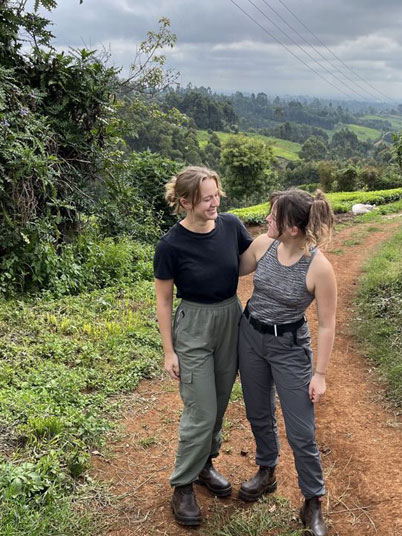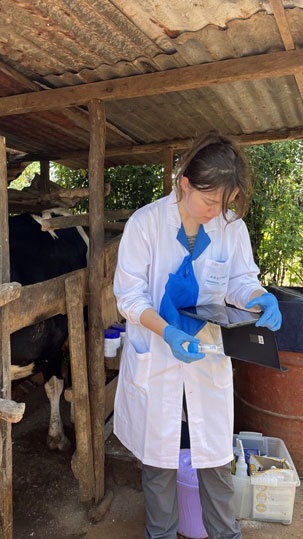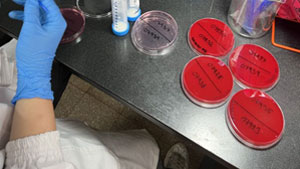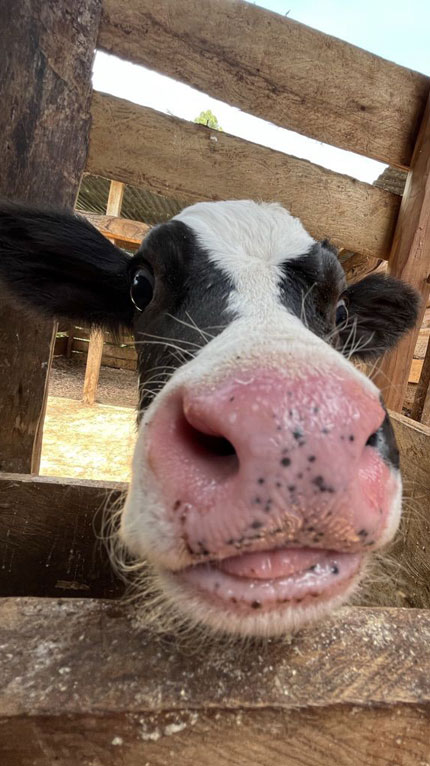Doing your field work abroad?
For Rikke and Nanna, veterinary students with IVH, the opportunity to collect data for their MSc thesis in Kenya became an experience they would not have been without. A chance to meet the farmers and veterinary officers who will hopefully benefit from their research.
 We are Nanna and Rikke, veterinary master students at UCPH. We were doing part of our final year in Kenya investigating the prevalence of mastitis and testing a Danish point-of-care diagnostic assay as part of an AMR project in Kenya led by the International Livestock Research Institute (https://www.ilri.org/). More specifically, we have been evaluating the performance of this test in a limited resource setting and included field visits to dairy farms in Kiambu county, neighbouring the capital Nairobi. We are both curious to work with and experience the world and its difference, so when the possibility opened to collect data for our master's thesis in Kenya, we did not hesitate for one second.
We are Nanna and Rikke, veterinary master students at UCPH. We were doing part of our final year in Kenya investigating the prevalence of mastitis and testing a Danish point-of-care diagnostic assay as part of an AMR project in Kenya led by the International Livestock Research Institute (https://www.ilri.org/). More specifically, we have been evaluating the performance of this test in a limited resource setting and included field visits to dairy farms in Kiambu county, neighbouring the capital Nairobi. We are both curious to work with and experience the world and its difference, so when the possibility opened to collect data for our master's thesis in Kenya, we did not hesitate for one second.
Working with the farmers We arrived in Nairobi, Kenya, on 2 September 2023 and stayed for 3 months. Our work was divided between fieldwork and lab work. Our objectives were to assess the prevalence of mastitis in smallholder dairy farms and the utility and adoptability of Point of Cow. We were lucky to be part of the AMR team at ILRI which gave access to a well-equipped laboratory and a great logistics support.
We arrived in Nairobi, Kenya, on 2 September 2023 and stayed for 3 months. Our work was divided between fieldwork and lab work. Our objectives were to assess the prevalence of mastitis in smallholder dairy farms and the utility and adoptability of Point of Cow. We were lucky to be part of the AMR team at ILRI which gave access to a well-equipped laboratory and a great logistics support.
We visited several farms in the Githunguri Co-operative and met dairy executive officers at Fresha Dairy, who were all very welcoming and collaborative. After having done quite a lot of aseptic milk sampling, we became very good at it, and it helped that the cows were calm and a good temperament. Cows did not have numbers but rather name tags and responded to their names when called. Getting close to these animals and the getting to know the farmers and veterinary officers has been invaluable to us. We would never have had such an experience without this project.
To secure collaboration and understanding for the project, we held a meeting with the farmers, the dairy executive officers, and animal health extension officers to demonstrate and get their views on Point of Cow in a Kenyan setting. There was a general interest in the test amongst all stakeholders especially the quick turnaround time. However, price is important for the farmers, and because the test is not implemented as part of Cooperative services, farmers would have to pay for the tests themselves. And lastly, the test is not yet available in the Kenyan market.

Experiencing Kenya
A major difference between Denmark and Kenya is, of course, the culture and the people. We have seen and experienced that Kenyans are very kind, polite, helpful, and extremely sociable. On our first day at breakfast in the cafeteria, the staff asked if we wanted to share a table with another guest instead of sitting by ourselves – thus introducing us to a new friend.
The Kenyans were keen to present their culture and all the things that they are proud of. Our Kenyan colleagues have been helping us to choose the best local foods and drinks, teaching us about Kenya and its history, and the best places to visit. They have even tried to teach us Kiswahili. They have shown us around town, answered our (sometimes silly) questions, and taken care of us like family.
The Kenyans were also very interested in learning about us and Denmark. On our visits to the farmers, we told them about dairy production in Denmark and how we have robots for milking the cows and cleaning the stables. We shared our stories 
and culture, explaining ‘hygge’, which isn’t easy to translate, but we noticed how alike we are when it comes to fundamentals.
So, was it worth it?
"Getting close to the animals, getting to see different livestock production systems, and meeting and working with different people has been invaluable to us. We would never have had such an experience without this project. We have met so many people (colleagues, farmers, children, ILRI staff, Uber drivers, and more), and we have listened to their captivating stories with great excitement. It has been amazing and unique to experience this, and we really feel privileged. This is before we mention the sun, warm air, and the heavy downpours of rains. So, YES it was most definitely worth it!"
Rikke and Nanna, were supervised by Arshnee Moodley, Associate Professor in Veterinary Clinical Microbiology. She is jointly appointed with ILRI as an AMR Team Leader.
Funding: All research cost (field and lab work) was covered by IRI ILRI covered all the research costs (field and lab work) and accommodation. This was supported under the CGIAR One Health Initiative https://www.cgiar.org/initiative/one-health/.
